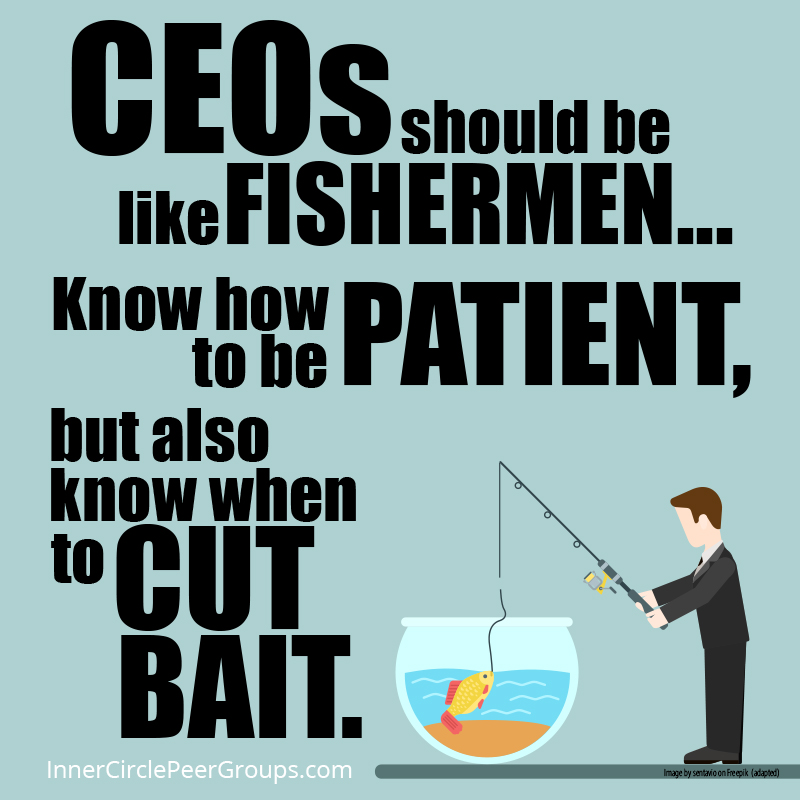Abigail got promoted to CEO of the engineering firm she’d been employed by for just over a decade. Along with the promotion came Jeremy, the executive assistant. After just a few months, Abigail’s frustration with Jeremy’s performance was growing. She’d repeatedly conveyed the job duties and her expectations to him and promptly addressed his behaviors when duties were not completed on time and expectations were not met. Abigail invested several months and a chunk of her time into helping Jeremy improve. He’d been with the company for more than a year and she just didn’t want to let him go… especially with her being newer to the role of CEO.
She brought this situation up in her peer advisory group…. Every month – for FOUR MONTHS.
During the CEO peer group sessions, her “board of advisors” would ask her questions like: “Have you documented the performance problems?” and “Do you feel you need to discuss this with an employment attorney? In other words, do you feel at risk of being exposed to a potential lawsuit?” or “Have you documented every time he’s neglected to complete his duties or meet agreed upon expectations?” She confirmed she had and had invested in additional training and one-on-one mentoring. Abigail and her fellow/sister members of her Inner Circle group openly discussed possible outcomes and the process of letting someone go – even addressing the emotions that come with it.
Each month, she would bring the same situation to the Inner Circle session with new stories of how Jeremy had let her down and not done his job properly. Her frustration was starting to show and she confessed that she was working extra hours to make up for the time she spent trying to help improve Jeremy’s performance; even losing some sleep at night replaying the day’s disappointments and wondering what new ones she would be facing the next day.
After repeatedly being assured that Abigail had dotted her “I”s and crossed her “T”s, the members collectively agreed – Abigail had done all she could do. It was time to cut her losses. When she returned yet again the fourth month still mulling over the same situation, her peers had finally had enough. “Abigail, you need to resolve this now. You MUST let him go. Until you do, you are no longer allowed to come to our sessions.” Knowing they were right, Abigail left feeling both determined and relieved, knowing she was doing the right thing.
The very next month, Abigail returned to the group. Her countenance had lifted. Her demeanor was brighter. A smile again on her face. She looked refreshed. Of course, the group had to let her go first this month…. “Sooooo….?” Abigail reported that she’d sat down with Jeremy, reviewed the documentation of his poor performance with him, had him sign a termination agreement, provided him with his final check, wished him well and said goodbye as her security team walked him out.
“I really don’t think I would have made this move as quickly as I had – which was too long as it was – had it not been for all of you holding me accountable,” Abigail said to the group with gratitude in her tone, “I really can’t thank you enough… I have saved more time and money NOT having him around than I’ve spent on my membership for the past 9 months!”
To give closure to her time during that session, Abigail reported that she is now finding joy (and some challenges) interviewing for his replacement.
***NOTE***
Actual names, companies and specifics of the situation are intentionally not included to protect the confidentiality of our members.
——–
If you’ve ever faced a situation like this, found yourself feeling a bit lonely at the top and/or wanting to get feedback/confirmation from trusted colleagues, yet had no inner circle of trusted confidantes who’ve “been there, done that” to turn to, this is your chance to give Inner Circle CEO Peer Groups a try.
Request to participate in an actual session at no cost with no obligation to join and a 90-day money back guarantee.


Based on responses from CEOs who seek counsel/advice either from their advisory board or peers, 87% admit that they hate to fire.
OPINION POLL

Why do CEOs hate to fire?
-
Concern about the financial impact on the employee and their family
-
Prefer to invest in helping them improve their performance
-
Discomfort with the tough face-to-face conversation
-
Fear of legal ramifications / backlash / lawsuit
-
Anxious regarding the effect the termination will have on the organization as a whole




